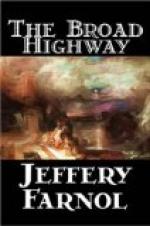“Come, come—none o’ that,” said the red-headed man, his eye more truculent than ever, “I ain’t a fightin’ cove myself, and I don’t want no trouble—all I asks is, what about Buck Vibart putting out Tom Cragg—in three rounds? That’s a civil question, ain’t it—what d’ye say now—come?”
“I says,” cried Tom Cragg, flourishing a great fist in the air, “I says as ’e done it—on a foul!” And he smote the table a blow that set the glasses ringing.
“Done it on a foul?” cried three or four voices.
“On a foul!” repeated Cragg.
“Think again,” said the red-headed man, “’t were said as it was a werry clean knock-out.”
“An’ I say it were done on a foul,” reiterated Cragg, with another blow of his fist, “an’ wot’s more, if Buck Vibart stood afore me—ah, in this ’ere very room, I’d prove my words.”
“Humph!” said the red-headed man, “they do say as he’s wonderful quick wi’ his ‘mauleys,’ an’ can hit—like a sledgehammer.”
“Quick wi’ ’is ’ands ‘e may be, an’ able to give a goodish thump, but as for beatin’ me—it’s ‘all me eye an’ Betty Martin,’ an’ you can lay to that, my lads. I could put ’im to sleep any time an’ anywhere, an’ I’d like—ah! I’d like to see the chap as says contrairy!” And here the pugilist scowled round upon his hearers (more especially the red-headed man) so blackly that one or two of them shuffled uneasily, and the latter individual appeared to become interested in the lock of his pistol.
“I’d like,” repeated Cragg, “ah! I’d like to see the cove as says contrairy.”
“No one ain’t a-goin’ to, Tom,” said the one-eyed man soothingly, “not a soul, Lord bless you!”
“I only wish they would,” growled Cragg.
“Ain’t there nobody to obleege the gentleman?” inquired the red-headed man.
“I’d fight any man as ever was born—wish I may die!” snorted Cragg.
“You always was so fiery, Tom!” purred the one-eyed man, blinking his pale orb.
“I were,” cried the prizefighter, working himself into another rage, “ah! an’ I’m proud of it. I’d fight any man as ever wore breeches—why, burn me! I’d give any man ten shillin’ as could stand up to me for ten minutes.”
“Ten shillings!” said I to myself, “ten shillings, when one comes to think of it, is a very handsome sum—more especially when one is penniless and destitute!”
“Wish I may die!” roared Cragg, smiting his fist down on the table again, “a guinea—a golden guinea to the man as could stand on ’is pins an’ fight me for five minutes—an’ as for Buck Vibart—curse ’im, I say as ’e won on a foul!”
“A guinea,” said I to myself, “is a fortune!” And, setting down my empty tankard, I crossed the room and touched Cragg upon the shoulder.
“I will fight you,” said I, “for a guinea.”
Now, as the fellow’s eyes met mine, he rose up out of his chair and his mouth opened slowly, but he spoke no word, backing from me until he was stayed by the table, where he stood, staring at me. And once again there fell a silence, in which I heard the tick of the clock in the corner and the crackle of the logs upon the hearth.




